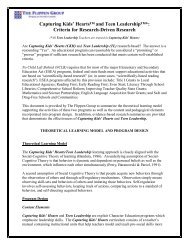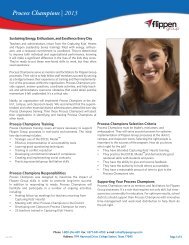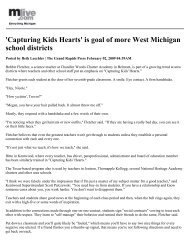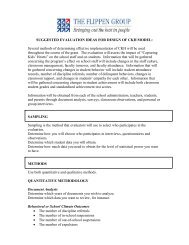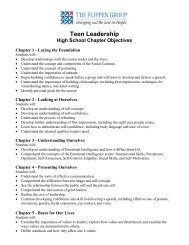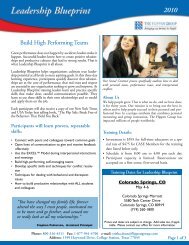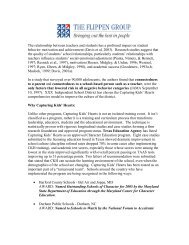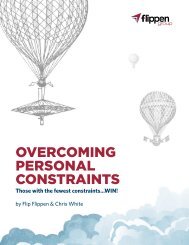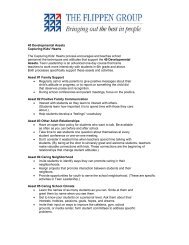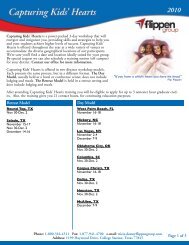Smart & Good High Schools - The Flippen Group
Smart & Good High Schools - The Flippen Group
Smart & Good High Schools - The Flippen Group
- No tags were found...
You also want an ePaper? Increase the reach of your titles
YUMPU automatically turns print PDFs into web optimized ePapers that Google loves.
CHAPTER 5: Fostering the 8 Strengths of Character—Outcome 1to or read about conflicting views, and then demonstrate,perhaps through a written report, their understanding ofthe arguments and evidence on different sides of theissue.Whatever the format, the goal should be to develop criticalthinking and the capacity for rational dialogue thatgrows from entering into the perspectives of others, howeverdeeply we may disagree.OUTCOME 1:Lifelong Learner and Critical ThinkerPromising Practice 3:1Use published curricular materialsthat develop critical thinking aboutvalue-laden current events.Ms. G. is in her third year of teaching 9th and 10th- gradeliterature. Like most high school teachers, she is pressedfor time. She is therefore very grateful to find high-qualityready-made lessons that develop critical thinking aboutcharacter-related issues. She draws these lessons fromCivics in Action (www.civicsinaction.org), an online biweeklyservice that uses current events to help studentsunderstand and practice ethical and intellectual virtues.Designed for secondary classrooms, Civics in Action lessonshave covered a wide-range of high-profile topics:September 11, high school hazing, Internet music piracy,the stem cell debate, the war in Iraq, the Abu Ghraib prisonerabuse scandal, ethnic persecution in Sudan, thepresidential election, and the “basket-brawl” betweenplayers and fans at an Indiana Pacers-Detroit Pistons basketballgame.“I use these lessons to meet statelearning standards.”Each lesson begins with three to four pages of backgroundnarrative laying out the important issues, followedby a list of key vocabulary for understanding the issue.<strong>The</strong> lesson plan for the teacher includes goals, virtues tohighlight, discussion questions, writing activities, extensionprojects, and links to relevant readings and websites.Ms. G. comments:I use the Civics in Action lessons to meet a number of thestate learning standards, such as being able to express apoint of view, develop one’s ideas, hold a conversation, andrespond to another’s viewpoint. I find my students need alot of help in these areas. Many of them don’t have opportunities,either in their families or with their friends, for thekinds of conversations we’d like them to be able to havewhen they get to college. For many of them, their educationuntil now has been mostly “listen to the teacher, read thetext, answer the questions.”At this age they love to share their opinions, but I wantthem to really listen and share in light of what someoneelse has said. We always sit in a circle to encourage eyecontact. At the start of the year, we set ground rules forgood discussion. I don’t make them raise their hands; Iwant them to be able to follow the conversational cues. I sitback for the most part, posing an occasional question:“Have you experienced something similar to this?”; “If youwere in this person’s shoes, how would you feel?” I givecredit for participation and also give them a rubric for that.She says the Civics in Action lessons work well with studentsof varied backgrounds.I have honors students, and I have struggling students.<strong>The</strong>se lessons give all of them the opportunity to thinkabout what they believe and express their beliefs withgreater confidence. It’s refreshing for me to listen to theirideas about these issues.“For many students, their educationhas been, ‘Listen to the teacher,answer the questions.’”<strong>The</strong> prepared lessons, she says, ensure a greater level ofobjectivity than if she were to try to create them.First of all, I wouldn’t have the time—but even if I did, Ithink there would be a tendency for me to select issues thatI have strong opinions about. My own bias might creepinto how I would frame the issue. <strong>The</strong> Civics in Action lessonsdo an excellent job of presenting all facets of an issue.I keep my opinion to myself, even though my studentsalways try to get it out of me.She says she has also been pleased by some of the connectionsstudents make across lessons.About a year ago, we did the lesson about the awful highschool hazing incident that happened in a Chicago suburb,and discussed the “mob mentality” that can lead people togo along with what the group is doing rather than exercisingindividual judgment and responsibility. Recently, whenwe discussed the lesson on the abuse of prisoners in Iraq,they brought up the hazing incident and the similaritiesthey saw between the two situations.94<strong>Smart</strong> & <strong>Good</strong> <strong>High</strong> <strong>Schools</strong>




